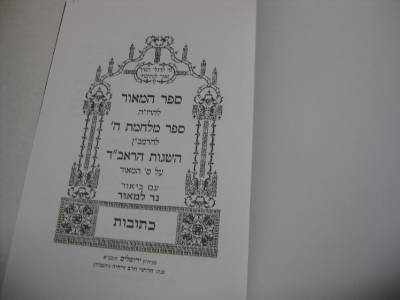Thanks to Eli Chitrik
Makos 7a
1. In regard to the discussion of whether or not a guarantor on a loan can be a witness on the loan which he guaranteed – if he is considered to have a conflict of interest or not; we mentioned a famous argument among the Rishonim. Namely the Ra’vad, the Raza”h and the Ramban.
The Ri”f (See here in English Hebrew) was considered the foremost Posek of his generation and it was inconceivable for a time anyone to argue with his way of learning.
That all changed until the Raza”h, R Zerachiah halevi, (See here in English Hebrew) wrote his book The Maor

(Maor Hakotton on Berachos and Seder Moed, and Maor Hagodal on Seder Nashim and Nizikin. He is commonly known as the Baal Hamoer) which is basically a book of objections, consistently raising issues to the way the Rif decides Halocho.
This book cause a major uproar in the Jewish world, some even say that he was forced to leave the city of which he was a Rav at the time.
In order to defend the Rif, the Ramba”n wrote a Sefer called Milcahmos Hashem “The war of Hashem” in which he defends the Rif from the objections of the Rza”h. Just a quick read through the Mlichamos and you will notice one of the sharpest use of language in Rabbinic literature.

2. The Misnah mentioned that R Akiva and R’ Tarfon say “If we were in the time of the Sanhedrin we would have never put anyone to death” this is because they would ask so many questions (more of this next week) that it would be impossible to conclude with a conviction.
R’ Shimon Ben Gamliel objected to this logic saying that it negates the deterrent factor.

We mentioned that R’ Akiva and R’ Tarfon were indeed in the times and members of the Sanhedrin. What they meant was if they were in the times that the Sanhedrin were still applying the death penalty. As we learned in Sanhedrin they stopped putting people to death 40 years before the Churban Bayis.

On a more humorous note we mentioned that R’ Akiva and R Tarfon were academics and perhaps had more of a ‘liberal’ view. Therefore they were of the opinion that the death penalty was unnecessary.
R’ Shimon Ben Gamliel, is of the opinion that if we were to follow R Akiva and R’ Tarfon’s of not applying the death sentence it would increase the murder rate. Why? Being the Nasie Hador (the president) he was the one who was responsible for ‘keeping the order in town’. Society needs rules and regulation. He thus had more of a conservative view. The death penalty, even if rarely used, was needed for the purpose of maintaining a cohesive and law abiding society.
3. The Gemara states that there is a difference between the commandment for setting up courts in E”Y and in all other places. In E”Y you establish courts in every single province and in every city. However outside of E”Y you only need to establish courts in every province but not in every city.
Reb Yaakov Emdin (The Yavetz)

notes something very funny. From this Gemara comes out that the Jews living outside of E”Y are worse than Goyim which need to set in every city and the Jews need to set up only in every province. Comes out the Goyim have more Chiyuvim?!
(He does note that the Ramaba”m had a different Girsa which would explain this distinction)
Conversely this can also be seen as a Ma’le that the Jews need less courts because there is less crime in their areas
. More on this next week.